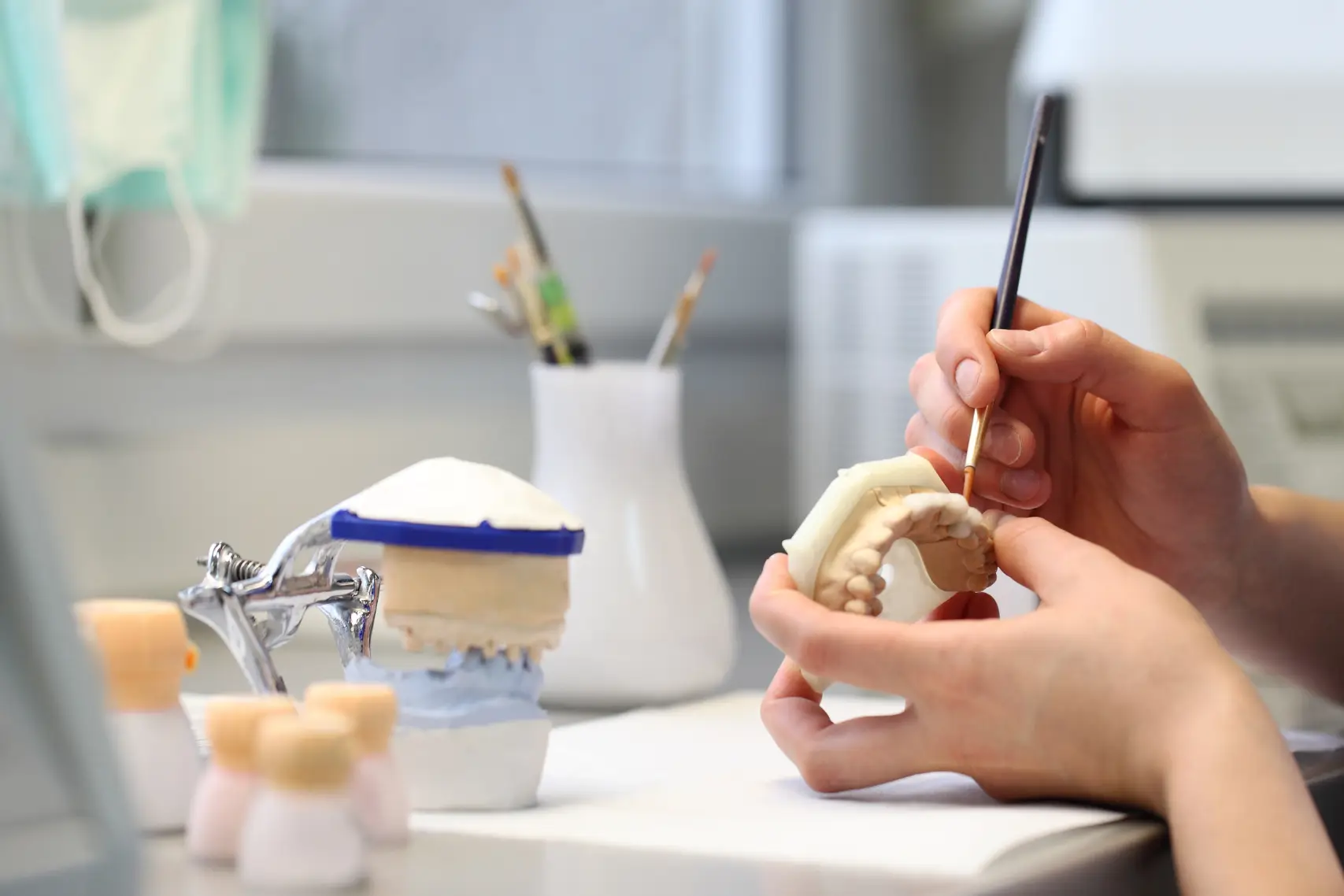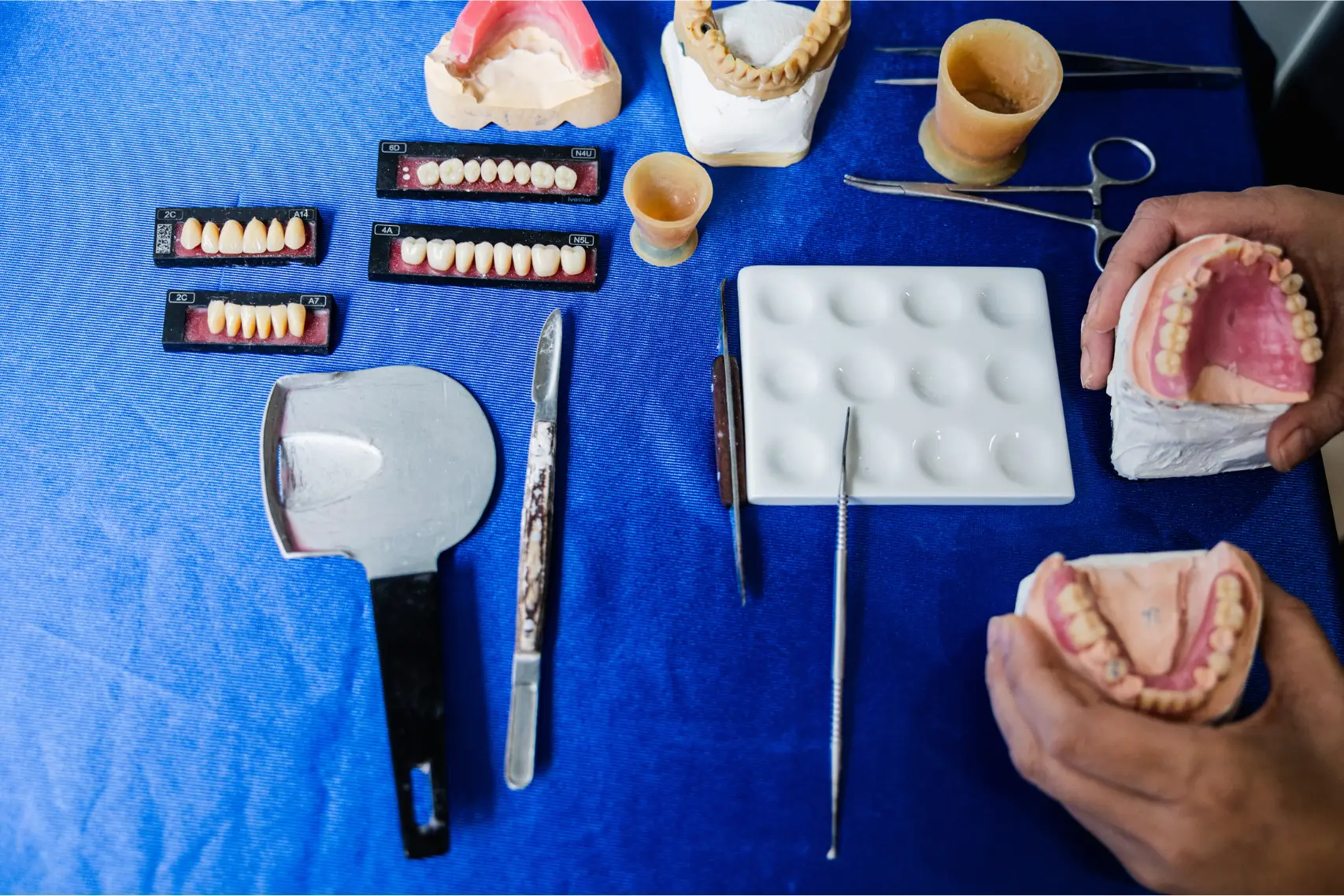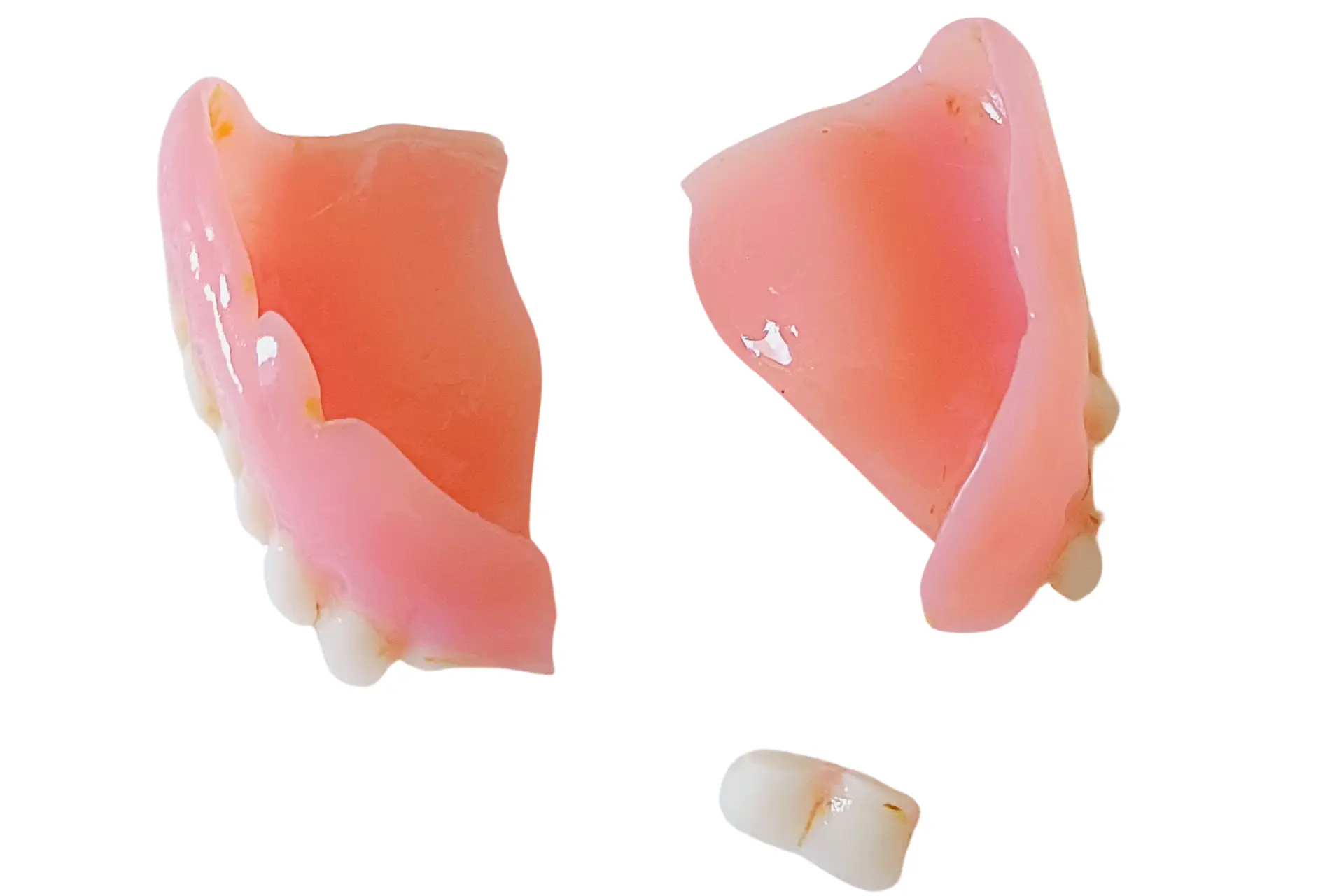Denture Repair Kits: Can I Repair a Denture?

Dentures are an essential solution for restoring confidence and oral functionality, but what happens when they break or need adjustments? Whether you’re dealing with a chipped tooth, a cracked acrylic base, or a loose fit, understanding the possibilities of repairing dentures is crucial for maintaining the safety of your smile. From the danger of at-home remedies to professional repair options, this article will guide you through everything you need to know about how to repair a denture and why professional care is always the best choice to fix broken dentures.
If you’ve been curious about the possibilities you have if your dentures break, if you are able to repair them yourself at home in order to save money or if it is mandatory to visit a professional everytime, keep reading and discover everything you need to know about denture repair, denture repair kits sold online and the technic process of repairing dentures.
Implant-supported Dentures—Types and How They Are Made
Dentures or false teeth can be either conventional (the removable ones that take support from the gums) or implant-supported (dentures placed over implants that can be both removable or fixed). Anyone who has finally gotten implant-supported dentures after months of careful decision-making, extensive dental appointments, and a handsome amount is surely ready to keep them safe. Despite that, dentures can break, chip, or crack, and that’s when we think about possibilities of repairing broken dentures.
Inherently, dentures are made of a durable material called acrylic, a type of resin. They can be with or without a metal backing.
Implant dentures are of 2 types:
- All-on-4 hybrid dentures: These dentures are permanently attached to four implants in the jaw. They have a strong metal frame that is screwed onto the implants, providing a stable base. On top of this frame is an acrylic part that holds the artificial teeth and covers the gums
- Snap-on dentures or implant overdentures: These dentures “snap” onto implants in the jaw, using attachments at the back. They have a softer fiber piece that helps the denture connect securely to the implants while allowing you to take it out when you want
Some also have a metal bar attached to the implants that hold the denture securely in place. Bar-retained dentures are similar to snap-on dentures but use a metal bar instead of soft connectors for extra stability.
In all cases, the acrylic undergoes a thermal or heat-induced ‘curing’ cycle—a laboratory-side setting process for about 3–9 hours—and is finished and polished before you receive your brand-new smile.
Though innovative additives like carbon fibers, alumina Al2O3, or tricalcium phosphate (TCP) are being routinely used to tag them ‘UNBREAKABLE,’ the resilience of dentures must not be confused with endurance. Like with everything else, dentures need repair from time to time.
Can Implant-supported Dentures Break? The Causes and Risk Factors

Dentures can giveaway and beak due to an interplay of many factors:
- Degradation of the denture material: Acrylic undergoes stress-related fatigue with time. The large amounts of stress and strain of biting, chewing, and grinding regularly make older dentures more vulnerable to breakage. These could be anything from cracks, chips, teeth falling off, to dentures loosening
- Improper storage of dentures: When dentures are not stored in water for hours to days, they shrink and become less stable. This makes them more prone to breakages
- Biting on something hard—raw vegetables like a whole carrot or a whole apple
- A blow to the face, accidents, etc
- Slipped out of hand, dentures that fell down, and dropped into the sink
With implant-supported dentures, the breakages and denture repairs are trickier. How?
Unlike traditional removable dentures, implant dentures tend to crack more along the implant fixture.
- Making space for the fiber gasket, screws or metal bar significantly thins the denture base in the regions
- The lack of bulk results in poor strength if the denture is processed in the lab without precautions
Moreover, you must follow all dietary techniques and denture-wearing and removing methods to ensure the longevity of the implant denture.
Repairing Dentures at Home May Not Be The Best Idea—Why

"Though built to last long, with time, use, and accidents, dentures may snap. Dentures today are often marketed as 'unbreakable;’ however, you must understand that the mouth is dynamic—it is subjected to a variety of stresses and gum and bone changes. "
Dr. Medha Gupta, Prosthodonthics, Implantologist and Medical Communication Expert
In the case of implants, repairing dentures at home may not be a good idea.
If not repaired properly, repairing dentures at home, with social media-based DIY tricks like super glue can lead to complications and sometimes dental emergencies.
These could be:
- Repeated traumatic mouth ulcers
- Pain while chewing
- Incessant cheek bites
- Lip bite
- Cuts and bleeding
- Implant abutment fractures
- Accidental swallowing of chipped denture portions or broken implant parts
- Cosmetic issues of poorly re-attached denture teeth
- Health issues, in case the glue turns out to be toxic
In case you are traveling or unable to see the dentist, remember that repairing dentures at home is a stopgap option. It is always advisable to visit the clinic.
Sometimes your broken denture might fit—but it is best to not keep wearing it to avoid dental hazards and further damaging the denture beyond repair.
Tips for Denture Repair
Repairing dentures by a professional is the best practice. Once you visit the dentist, there are 2 ways to go about the process:
Denture repair in-clinic
When the damage is minor, the prosthodontist/implantologist can fix it chairside. These include:
- Fixing minute chips or cracks in the denture along the tooth housing areas with fast-set (cold cure) acrylic.
- Replacing 1-2 broken or lost denture teeth
- Finishing and polishing the rough surfaces to avoid ulcers
- Tightening or replacing the gaskets or bar housings to fix loose dentures
- Adjusting and re-fixing the gasket metal housings if loose
These repair procedures are handled in one visit and avoid a full replacement or lengthy lab work.
Denture repairs that need to be sent to the technician
Some damages go beyond repair and need lab support. They are:
- Cracked acrylic base: Dentures that are broken along the implant attachment area are fixed with metal meshes and additional acrylic.
- Attachment Issues: Sometimes, the housings and the gaskets that connect the denture to the implants can break or get displaced. Replacing or repairing these attachments often needs lab assistance if custom parts are involved.
- Broken attachment screws and screw sockets: They are usually replaced, and the denture part surrounding it is repaired.
- Severe warpage of the acrylic base: If the damage, like a crack, is extensive, it needs to be sent to a lab for bulk acrylic addition and repair.
Dentures that need to be replaced
There are instances where a damaged denture is beyond repair. These cases demand fresh impressions and lab processes. These are:
- Damage to the metal framework: The metal framework that attaches to the implants can sometimes bend, crack, or break. Since this metal structure is essential for keeping the denture stable, any damage to it usually requires casting a new metal structure.
- Warped or misshaped denture base: If the base of the denture becomes warped or misshapen, it won’t fit properly in the mouth, so a replacement is needed.
- Changes in Gum or Bone Structure: The shape of your gums and jawbone may alter over time, especially if you’ve been wearing dentures for a while. If your previous denture no longer fits due to these changes, you will need to get a new one made using updated impressions. However, this is less likely with implant-supported dentures, as implants preserve bone.
What Is a Dental Prosthesis?
When we refer to the term “prosthesis” we are talking about an artificial body part that replaces another one missing, whether it is an arm or tooth.
Because of this, dentures are just one type of dental prosthesis; there are also other ones, like dental bridges or crowns.
Learn everything about dental prostheses and their characteristics from our expert doctor, Samintharaj Kumar, Smile24h Expert Dentist, and Certified ZAGA Doctor in Singapore!
Key Takeaways
Hitting $3 billion by 2032, the denture market is here to stay. Dentures today are often marketed as ‘unbreakable;’ however, you must understand that the mouth is dynamic—it is subjected to a variety of stresses and gum and bone changes.
At Smile 24h, treatment continues beyond the procedure. We ensure personalized support for every patient and help them with the dos and don’ts of denture care, denture repair, and dental emergencies. Smile 24h Expert Clinics, is home to Certified ZAGA Doctors, who are known for their expertise in advanced implantology. They will address all your queries and help you navigate the repairing dentures process hassle-free. With the ZAGA Concept and its “patient-first” approach, life with the new dentures is more enjoyable than before.

Dr. Medha Gupta, a Prosthodontist & Implantologist with over six years of clinical experience, is also a Medical Communication Expert working with healthcare firms and solopreneurs in India, the EU, the USA, and Singapore. Her expertise lies in transcribing complex medical and dental information into words that resonate with the audience, our readers. As a healthcare business writer and reviewer, she boosts brand credibility for medical/dental practitioners and HealthTech firms by speaking the ‘founder’s mind’ across marketing and sales platforms.
Still have questions? Find your nearest specialist and discover how we can help improve your quality of life with expert care

